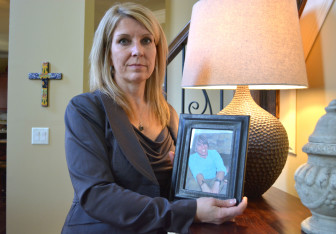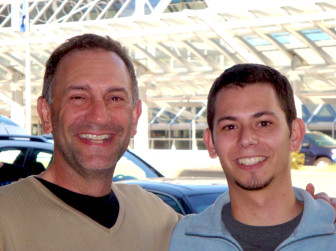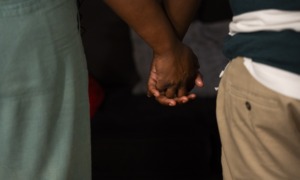
Elly Yu / JJIE
Sherry Ajluni lost her son Brandon more than three years ago. She, like many parents, didn’t know where to turn for help in the beginning.
CUMMING, Ga. — More than three years ago, Sherry Ajluni got a call no mother would ever want to receive. Her 21-year-old son, who’d been struggling with heroin addiction, was missing from his dorm room. Four days later, he was found in an orchard near his school in Albany, Ga., the victim of apparent suicide.
Her son, Brandon Schiff, was the oldest of six children and had wanted to be a history teacher. He loved helping others. His mother said she was hopeful about his future up until the very end.
“I never expected him to take his life,” Ajluni said.
When her son first became addicted, Ajluni said, she didn’t know where to start, who to turn to or what treatment programs would be best. They first took him to a therapist, thinking Brandon would get through it quickly.
“Clearly, we had no clue about addiction or that it was a disease,” Ajluni said.
Ajluni is not alone. Parents across the nation struggle to find the information and resources they need to help their addicted children. To close the information gap, support groups for parents are springing up, as well as organizations working to destigmatize addiction and promote addiction prevention and treatment.
One such organization is Shatterproof, founded by Gary Mendell, who for the last several years has been working to build it into a strong national voice for addiction prevention and treatment.
“There is no national organization for this disease,” Mendell said. “You have it for cancer, for diabetes – you have it for everything but drug and alcohol addiction.”
Mendell says he’s working to make the Connecticut-based Shatterproof in to a large-scale national association like the American Cancer Society or Autism Speaks, and has raised $7 million so far. His target is for it to be an organization slightly smaller than the American Heart Association at an annual budget of $500 million a year.
“That’s what the people of this country deserve,” he said.
Mendell lost his son, Brian, to addiction in October 2011. And instead of returning to his job as an executive at a hotel investment firm, he threw himself into researching everything about addiction and what had taken hold of his son.
“I found out how big this issue was,” he said. “When Brian was alive, it was just about Brian. I didn’t know it was going on across the country.”
Nearly one in 10 Americans over the age of 12 actively uses drugs, and the number has increased in recent years, according to the Substance Abuse and Mental Health Services Administration. More than 100 people every day die in the United States due to drug overdose, according to the Centers for Disease Control and Prevention.
“This is the largest social injustice of our era,” Mendell said. “This is about protecting our kids.”
He says Shatterproof’s goal is to accelerate research into prevention and recovery programs, and to help bring science-based treatment options into communities.
Today, there are still many different kinds of rehabilitation programs — everything from religious programs to in-patient care — and parents must often rely on word of mouth.
“It’s an unregulated industry,” Mendell said. “It’s not standardized and we have no way of knowing which ones are using what.”

Gary Mendell
Gary Mendell with his son Brian Mendell. Gary started Shatterproof after he lost his son to addiction in October 2011.
Last year, Mendell presented Shatterproof’s plan at the Clinton Foundation’s “Health Matters” conference, and is now hosting fundraising events across the country. By advocating on a national scale, Mendell says, he wants to break the stigma around people who struggle with addiction.
“They’re going to get treated with love and compassion that anybody with a disease deserves,” he said.
Back in Georgia, Ajluni has been working to raise awareness in her community by speaking at events and working with the Forsyth County Drug Awareness Council.
Others in her community have joined her in the cause. Her friend, Kate Boccia, an Atlanta real estate agent, also became discouraged by the lack of resources when her son became addicted to heroin. He went in and out of treatment programs, until he committed an armed robbery and is now serving a 15-year sentence.
“As parents, we’re just overwhelmed, frustrated,” Boccia said. “There’s really no ‘click here’ button. There is for every other disease.”
Boccia began her own advocacy group, H.O.P.E., after writing an op-ed about her experience in the Atlanta Journal-Constitution. She said she was surprised by the number of parents who reached out to her with similar stories.
“We are facing a crisis of addiction [and] incarceration,” Boccia said.
For her part, Ajluni says she hopes to share what she’s learned with other parents struggling with their child’s addiction.
“[At first], we don’t understand our child has just been diagnosed with – like cancer – a terminal illness,” Ajluni said. “We have no idea that they’re close to death.”
She says her son Brandon, who wanted to be a history teacher, talked about helping students stay off the path he’d taken. He knew the pain of struggling with addiction. It’s one of the reasons why she’s taken the helm to help save other children, she says.
Financial supporters of Youth Today may be quoted or mentioned in our stories. They may also be the subjects of our stories.



























